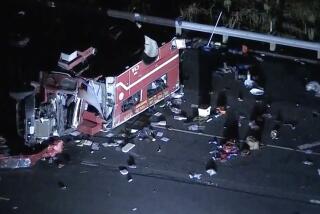25 allegedly file fraudulent claims against Medi-Cal
Twenty-five Southern California residents were charged Thursday with seeking payment from the state for providing in-home care to clients who were, in fact, dead, hospitalized or in jail, prosecutors said.
The charges, involving $93,053 in fraudulent claims, were filed Thursday afternoon in Los Angeles County Superior Court as part of a campaign to rein in Medi-Cal fraud, said state Atty. Gen. Jerry Brown.
“These individuals shamelessly bilked the Medi-Cal program by claiming payment for services never rendered,” Brown said. “In fact, their supposed clients were dead, hospitalized or incarcerated.”
Medi-Cal’s In-Home Supportive Services program allows workers to get paid for providing non-medical services, including housekeeping and meal preparation, for the impoverished sick, elderly and disabled.
Last year, more than 400,000 Californians received in-home healthcare services, twice as many as in 1999, Brown said, and the state’s cost has ballooned to more than $2 billion per year.
The program is aimed at allowing the elderly and disabled to stay in their homes, saving the expense and stress of having the incapacitated put in costly nursing homes.
The Times reported last month that loose oversight and bureaucratic inertia had allowed fraud to fester in the program, resulting in hundreds of reports of fraud and abuse going without investigation.
Each worker was charged with one count of grand theft and one count of presenting false Medi-Cal claims. Thirteen of those charged had prior criminal records.
The largest fraud case involved Richard F. Villegas, 38, of Downey, who allegedly submitted false claims totaling $13,243 by forging the signature of his deceased father, who was his in-home healthcare worker.
Scott Mann, a representative of the Service Employees International Union, which represents many in-home support workers, said the union “condemns fraud” in the program and believes the state should provide more money for oversight.
--
More to Read
Sign up for Essential California
The most important California stories and recommendations in your inbox every morning.
You may occasionally receive promotional content from the Los Angeles Times.











